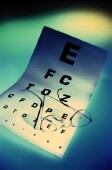October 22, 2014


Latest Eyesight News
MONDAY, Oct. 20, 2014 (HealthDay News) — A new implantable eye device might make reading glasses a thing of the past, researchers report.
Many people over age 40 develop blurriness in their near vision (presbyopia), which makes it difficult to see up close. The condition affects more than 1 billion people worldwide.
New products designed to treat the condition include a thin ring inserted into the cornea of the eye that adjusts the depth of field to enable a person with presbyopia to see near and far. The KAMRA device can be implanted in about 10 minutes with only topical anesthesia, its developers say.
The device was tested in more than 500 patients, aged 45 to 60, with presbyopia who were not nearsighted. Three years of follow-up showed that the device enabled 83 percent of the patients to see with 20/40 vision.
This meant they could read a newspaper or drive a vehicle without corrective lenses, according to the study released Saturday at the annual meeting of the American Academy of Ophthalmology in Chicago.
If complications occur, the device can be removed, making it a reversible treatment. That’s not the case for some other treatments for presbyopia, the researchers noted.
“This is a solution that truly delivers near vision that transitions smoothly to far distance vision,” study author Dr. John Vukich, a clinical adjunct professor in ophthalmology and vision sciences at the University of Wisconsin, Madison, said in an academy news release.
“Corneal inlays represent a great opportunity to improve vision with a safety net of removability,” he added.
KAMRA is available in Asia, Europe and South America, but has not yet been approved in the United States. Two other types of corneal inlays are also being developed for the U.S. market.
The data and conclusions of research presented at meetings are typically considered preliminary until published in a peer-reviewed medical journal.
— Robert Preidt
 Copyright © 2014 HealthDay. All rights reserved.
Copyright © 2014 HealthDay. All rights reserved.
SOURCE: American Academy of Ophthalmology, news release, Oct. 18, 2014
![]()